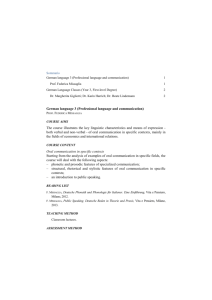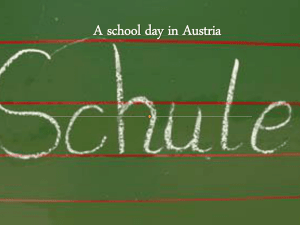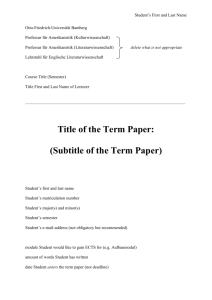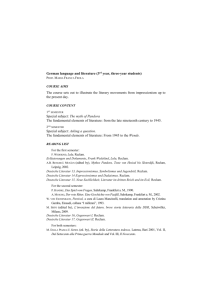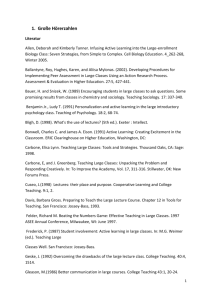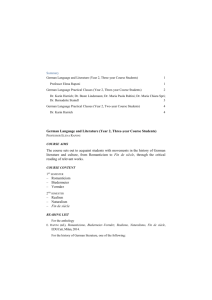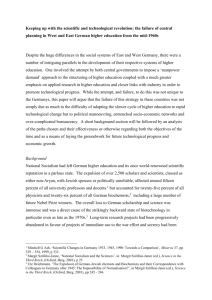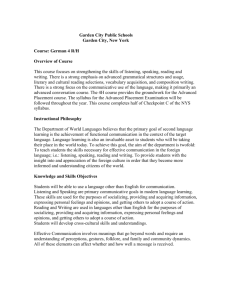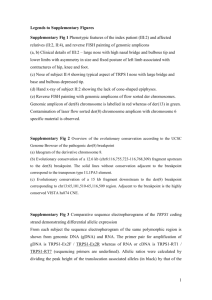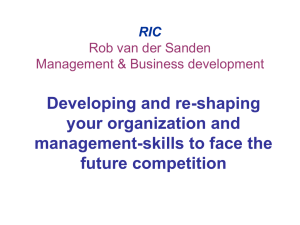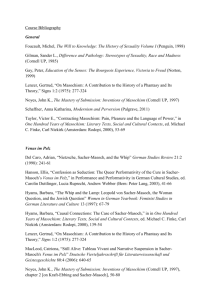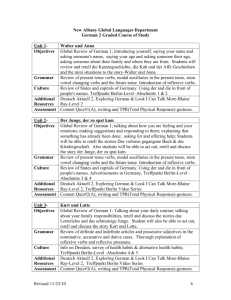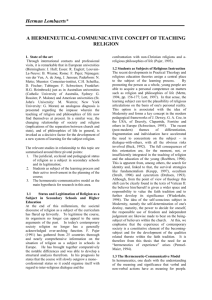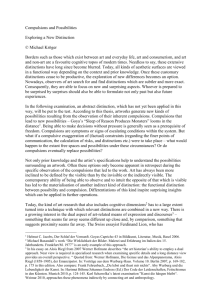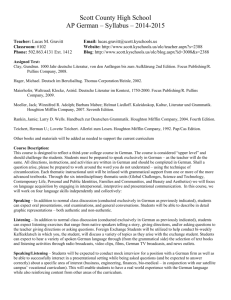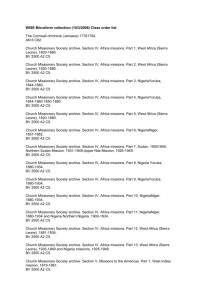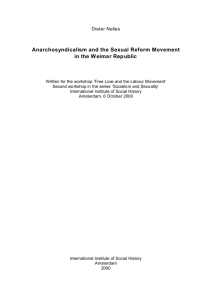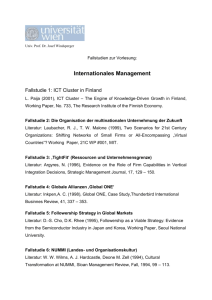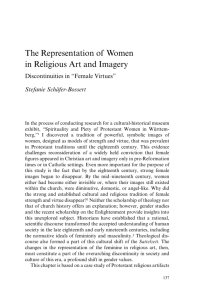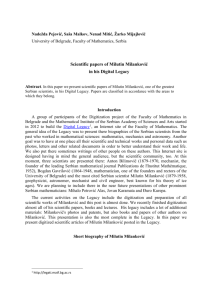Professor Enrica Yvonne Dilk
advertisement
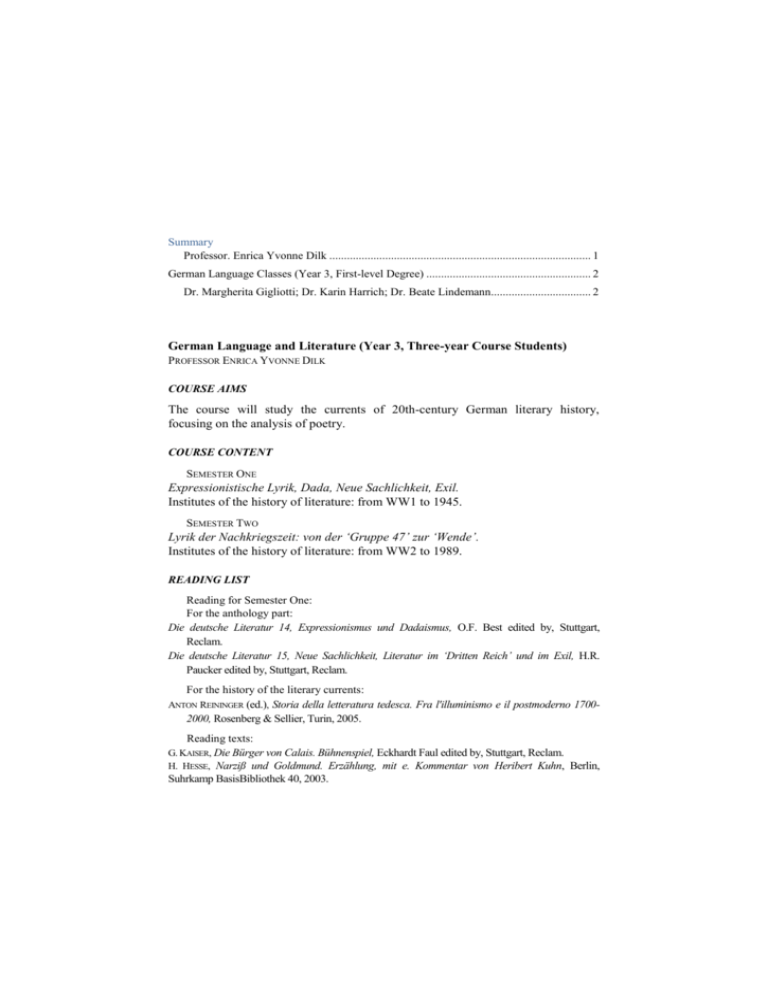
Summary Professor. Enrica Yvonne Dilk ......................................................................................... 1 German Language Classes (Year 3, First-level Degree) ........................................................ 2 Dr. Margherita Gigliotti; Dr. Karin Harrich; Dr. Beate Lindemann.................................. 2 German Language and Literature (Year 3, Three-year Course Students) PROFESSOR ENRICA YVONNE DILK COURSE AIMS The course will study the currents of 20th-century German literary history, focusing on the analysis of poetry. COURSE CONTENT SEMESTER ONE Expressionistische Lyrik, Dada, Neue Sachlichkeit, Exil. Institutes of the history of literature: from WW1 to 1945. SEMESTER TWO Lyrik der Nachkriegszeit: von der ‘Gruppe 47’ zur ‘Wende’. Institutes of the history of literature: from WW2 to 1989. READING LIST Reading for Semester One: For the anthology part: Die deutsche Literatur 14, Expressionismus und Dadaismus, O.F. Best edited by, Stuttgart, Reclam. Die deutsche Literatur 15, Neue Sachlichkeit, Literatur im ‘Dritten Reich’ und im Exil, H.R. Paucker edited by, Stuttgart, Reclam. For the history of the literary currents: ANTON REININGER (ed.), Storia della letteratura tedesca. Fra l'illuminismo e il postmoderno 1700- 2000, Rosenberg & Sellier, Turin, 2005. Reading texts: G. KAISER, Die Bürger von Calais. Bühnenspiel, Eckhardt Faul edited by, Stuttgart, Reclam. H. HESSE, Narziß und Goldmund. Erzählung, mit e. Kommentar von Heribert Kuhn, Berlin, Suhrkamp BasisBibliothek 40, 2003. Reading for Semester Two: For the anthology part: Die deutsche Literatur 16, Gegenwart I, Gerhard R. Kaiser edited by, Stuttgart, Reclam. Die deutsche Literatur 17, Gegenwart II, Gerhard R. Kaiser edited by, Stuttgart, Reclam. For the history of literary currents: A. REININGER (ED.), Profilo storico della letteratura tedesca, Rosenberg & Sellier, Turin, 2005, 3rd edition. Reading texts: F. DÜRRENMATT, Der Besuch der alten Dame, Zürich, Diogenes, 1988. C. WOLF, Der geteilte Himmel, Suhrkamp BasisBibliothek 87, Berlin, 2008. Students are expected to know the main phases of the intellectual biography of the authors dealt with in the course. Additional materials will be provided during the course. TEACHING METHOD Lectures. ASSESSMENT METHOD Oral exam. NOTES Foreign Languages and Literature students must attend both semesters. Students specialising in Language Expert for Management and Tourism and Languages, Literature and Communication should choose and attend only one semester. The Special Subject course will be accompanied by 30 hours of practical classes held by Dr. Gloria Colombo on the institutes of literary history; the first 15 hours of the practical classes are scheduled for Semester 1 and the final 15 hours for Semester 2. Further information can be found on the lecturer's webpage at http://docenti.unicatt.it/web/searchByName.do?language=ENG, or on the Faculty notice board. German Language Classes (Year 3, First-level Degree) DR. MARGHERITA GIGLIOTTI; DR. KARIN HARRICH; DR. BEATE LINDEMANN COURSE AIMS The course plans to further develop the student’s German language skills to the C1 Level for receptive abilities and the B2 Level for productive abilities, as defined by the Common European Framework of Reference for Languages. COURSE CONTENT The course is organised as follows: 1. Oral communication – Study and correction of pronunciation and intonation; German phonetics and prosody. – Listening exercises using authentic texts: oral summaries and reflections on the different types of texts; identification of primary and secondary information. – Study of formal communication in professional, social and institutional contexts. 2. Written communication – Advanced reading of texts of various types based on different methods (global and local comprehension, skimming and selective reading). – Production of different kinds of written texts related to professional, social and institutional contexts. – Written summaries of oral texts and reflections on diverse text types. – Development of active and receptive Fachtexte skills with a focus also on the role of translation. 3. Exercises that combine oral comprehension and written production (“dictacomp”) Students are advised to advance their oral comprehension abilities by using the material found on the internet (e.g., the listening passages at www.dwelle.de, www.diezeit.de) and at the CAP self-learning centre. The CAP advisors are at the student’s disposal to advise and guide their activities to consolidate/improve their language skills levels. READING LIST Em neu 2008 Abschlusskurs, Kursbuch + Arbeitsbuch + CD, Hueber, Ismaning/München (ISBN 978-3-19-541697-9). TSCHIRNER, Grund- und Aufbauwortschatz Deutsch als Fremdsprache nach Themen, Cornelsen Verlag, Berlin, 2008 (ISBN 978-3-589-501697-1). To prepare for the exam, the student needs to read one book and a collection of articles which they will then present following the indications given in class. Choose one book to read from the list below: L. DONNA, Endstation Venedig, Diogenes, 2002 (zusätzlich auch als Audiobook erhältlich: Steinbach Sprechende Bücher 2003). H. BÖLL, Und sagte kein einziges Wort, Dtv, 1998 (zusätzlich auch als Audiobook erhältlich: Hörbuch Hamburg 2007). T. BERNHARD, Ein Kind, Dtv, 2005. U. TIMM, Die Entdeckung der Currywurst, Dtv, 2000 (zusätzlich auch als Audiobook erhältlich: Litraton 2004). T. BRUSSIG, Am kürzeren Ende der Sonnenallee, Fischer, 2001. Recommended for further study: The following German, Austrian and Swiss newspapers and magazines: Frankfurter Allgemeine Zeitung, www.faz.de. Die Welt, www.welt.de. Süddeutsche Zeitung, www.sueddeutsche.de. Handelsblatt, www.handelsblatt.com. Die Presse, www.diepresse.at. Der Standard, www.derstandard.at. Die Zeit, www.diezeit.de. Neue Zürcher Zeitung, www.nzz.ch. Dolomiten, www.dolomiten.it. Format, www.format.at. Der Spiegel, www.derspiegel.de. Focus, www.focus.de. Stern, www.stern.de. Any magazine of particular interest to the student to support their learning of morphosyntax and vocabulary. Recommended readings K. HARRICH-M.C. SPOTTI, Wege zum Hören, EDUCatt, Milano, 2014, forthcoming. K. HARRICH-M.C. SPOTTI, Wege zum Lesen, EDUCatt, Milano, 2014, forthcoming. Each student must bring the following a. a reference grammar manual: DREYER-SCHMITT, Lehr- und Übungsbuch der deutschen Grammatik aktuell, Hueber, München (with the text of Lösungsschlüssel). Em Übungsgrammatik, Audio-CD, Hueber, Ismaning/München (ISBN 978-3-19-001657-0). b. a bilingual dictionary, a monolingual dictionary with synonyms and antonyms and a stylistic dictionary (for use throughout the course): L. GIACOMA-S. KOLB (eds.), Il dizionario di Tedesco, Zanichelli/Klett, Bologna. Dit, Dizionario Tedesco-Italiano/Italiano-Tedesco, Paravia, Turin. Duden, Deutsches Universalwörterbuch A-Z, 6. Auflage, Dudenverlag, Mannheim. Wahrig, Deutsches Wörterbuch, 8. neu bearbeitete Auflage, Bertelsmann, Gütersloh. Duden, Das Stilwörterbuch (Der Duden in zwölf Bänden), Bd. 2. Dudenverlag, Mannheim. Duden, Sinn- und sachverwandte Wörter/ Synonymwörterbuch der deutschen Sprache (Der Duden in zwölf Bänden), Bd. 8. Dudenverlag, Mannheim. c. Go to “Centro per l’Autoapprendimento” (or “CAP”, the self-learning centre on the 3rd floor of Via Morozzo della Rocca) to find further reading for personal study; the student should consult with the CAP advisor to agree the best study plan for their language level (www.unicatt.it/selda-cap). ASSESSMENT METHOD The written exam consists of: a) a vocabulary and grammar test; b) an oral comprehension test with open questions; c) a written comprehension test; d) a translation from specialised German; and e) a translation into specialised German. The student is allowed to use both monolingual and bilingual dictionaries for the translation part. The oral exam will consist of an interview on six recent newspaper and magazine articles prepared by the students in line with the indications given during the course and on one of the books chosen from the course reading list. NOTES The translation classes will be split into groups of students with the same curriculum. Students are strongly advised to attend classes regularly. A small number of written exam simulations will be proposed during the year. Additional information on the course syllabus and exam will be given in class and support materials handed out. The students can find further materials for exercises in the language lab. Further information can be found on the lecturer's webpage at http://docenti.unicatt.it/web/searchByName.do?language=ENG, or on the Faculty notice board.
